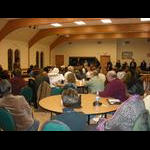 An interesting new website describes the activities of Milwaukee’s Safe Streets Initiative, an innovative antiviolence program involving Marquette Law School, local and federal law enforcement authorities, and community organizations and volunteers. The SSI represents an effort to bring principles of restorative justice to bear in mobilizing high-crime communities against gang- and drug-related violence. The core of the program seems to be the “call-in,” a session in which community leaders meet with known drug dealers and offer a choice: either stop dealing (in which case mentoring and community support will be made available to help the offender transition to a law-abiding life) or face swift, tough law enforcement action. (A photograph from the first call-in in 2007 is above.) The SSI also sponsors similar meetings for offenders returning to the community from prison.
An interesting new website describes the activities of Milwaukee’s Safe Streets Initiative, an innovative antiviolence program involving Marquette Law School, local and federal law enforcement authorities, and community organizations and volunteers. The SSI represents an effort to bring principles of restorative justice to bear in mobilizing high-crime communities against gang- and drug-related violence. The core of the program seems to be the “call-in,” a session in which community leaders meet with known drug dealers and offer a choice: either stop dealing (in which case mentoring and community support will be made available to help the offender transition to a law-abiding life) or face swift, tough law enforcement action. (A photograph from the first call-in in 2007 is above.) The SSI also sponsors similar meetings for offenders returning to the community from prison.
The community involvement piece seems to me an especially welcome development. As I discuss in a forthcoming article in the Standford Law & Policy Review, when police and prosecutors come down hard on drug offenders in poor, minority neighborhoods, it is important that their actions are seen as having legitimacy in those neighborhoods, rather than being perceived as arbitrary or racially discriminatory. Opportunities for neighborhood residents to voice their opinions and collaborate with law enforcement in responding to crime can help build the perceived legitimacy that is necessary for long-term gains in crime reduction.
 As the calendar turns from October to November, Gordon Hylton replaces Judi McMullen as our Featured Faculty Blogger of the Month. Judi’s macabre posts on the dark side of family law were perfect for the month of Halloween. In keeping with the pattern of seasonally suitable posts, I am hoping that Gordon will share his secrets for cooking a perfect turkey!
As the calendar turns from October to November, Gordon Hylton replaces Judi McMullen as our Featured Faculty Blogger of the Month. Judi’s macabre posts on the dark side of family law were perfect for the month of Halloween. In keeping with the pattern of seasonally suitable posts, I am hoping that Gordon will share his secrets for cooking a perfect turkey!
